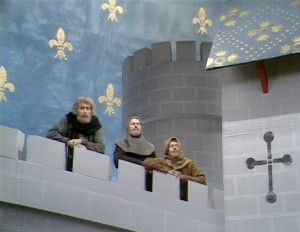 |
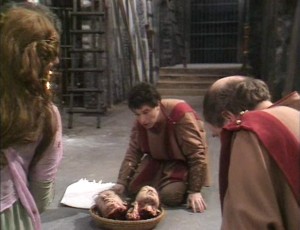 |
HERE WAS a prime cut of your actual Public Service Broadcasting with a capital “p”, illuminated in red with a filigreed gold border on the finest vellum WH Smith’s could supply. All 37 of Big Willie’s plays were to be filmed (actually, taped in the studio for the most part), largely uncut, with the best actors the Corporation could lay their hands on, forming an authoritative record of the finest English drama and preserving the classic canon for the ages. Cedric Messina, the bumptious producer-at-large who helmed the Beeb’s Chekhov-by-the-yard heritage drama stalwart Play of the Month, was the man in charge. Monetary support came courtesy of several American institutions, including Exxon and Time-Life (who’d helped the Beeb out with previous heritage drama flagship Churchill’s People, although they didn’t like to talk about it). But the cash came with strings attached. The Yanks, typically, took our historic literature very seriously (possibly due to not having much of their own), so they wanted this series done properly. And properly meant as trad-as-you-please. So, right, no setting the plays in the future, or in space, or on trapezes, or in modern day Lebanon, or in the mind of a mentally challenged eight year old homeless girl on the Fall’s Road. We want spears, we want castles, we want codpieces. And we want them Tuesday.
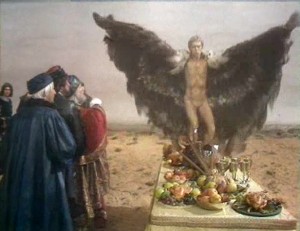 |
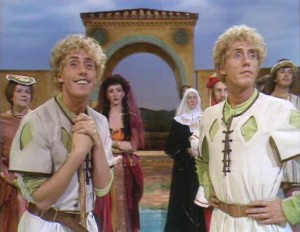 |
And this was what BBC2 and PBS viewers got. At least, initially. Wisely deciding not to screen the plays in chonological order (which would have meant opening with limb-hacking miseryfest Titus Andronicus, not a very good gambit for a Sunday evening prestige drama), they kicked off with a nice, traditional, mild cheddar adaptation of Romeo and Juliet. Some of what followed was better, some worse, a fair bit just as dull. The whole affair looked like it was going to play out in this respectful but unremarkable fashion, and critics cocked a snook (the best snook, as ever, belonged to Clive James, who dubbed the whole hubristic enterprise the ‘Bardathon’). But two years in, the creaking vessel was shaken up as Messina was replaced on the bridge by everyone’s favourite magpie intellectual, Jonathan Miller. Getting in a fresh load of directors and technical types, as well as getting his hands dirty himself, Miller pushed the ‘trad’ stipulations as far as was humanly possible. Recreating old masters in televisual form was a favourite game, and the plays started to look fantastic, as opposed to just very bright and rather cheap. (Any dullard who reckons videotape is doomed to look shoddy next to film should be shut in a room with the beautifully lit All’s Well That Ends Well and told to shut up.)
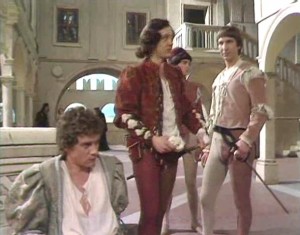 |
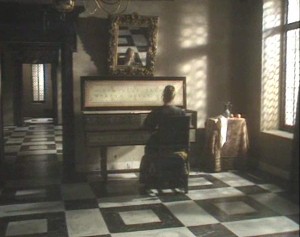 |
On the less famous productions, mucking about was the order of the day. Stylised minimalist sets came into force, leading Clive James to waspishly express his concern for the actor’s welfare in The Winter’s Tale, fearing that if one of them “sat on a cone instead of a cube, the blank verse would suffer”. (Admittedly, it didn’t completely work – that production’s brave attempt to realise the infamous stage direction “Exit, pursued by a bear” owed a lot to the set dresser of Steptoe and Son.) Popular parallels with the tragic milieu were drawn out: in particular medieval royal courts were shot like scenes from Dallas (which, ironically, was what most people were watching instead, over on BBC1). Elsewhere Miller busied himself with recreating tricky perspectives in that oft-neglected sixteenth century building medium, untreated plywood, and turned Trojan war epic Troilus and Cressida into a tunics-‘n’-togas version of M*A*S*H, complete with saucy pin-up etchings and an antiquarian Corporal Klinger. (He even, in a manic on-set bout of sub-Python whimsy, envisioned the prologue being spoken by Richard Baker, in full Renaissance garb, wandering around Troy with a BBC microphone in hand, until a passing Trojan points out that microphones haven’t been invented yet, and Baker stomps off in a huff. Sadly, somewhere along the line common sense prevailed.) Best of all, director Jane Howell, faced with presenting the titanic three-part Henry VI, shot the whole thing in a brightly-coloured recreation of a children’s adventure playground. Combine this with an electronic soundtrack by ‘Deadly’ Dudley Sutton, a swathe of randomly-applied regional accents, weird It’s a Knockout suits of armour looking like a cross between an American football quarterback and a DFS sofa, loads of really really long one-camera shots, a host of knowing looks to camera and a swordfighting Brenda Blethyn and the ten-odd hours practically flew by. And hardly anyone could moan about playing fast and loose with the Bard as the usual pernickety whingeing types knew damn all about the more obscure plays anyway.
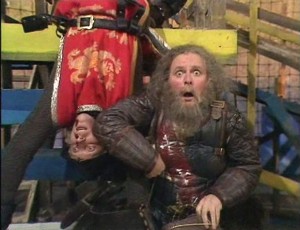 |
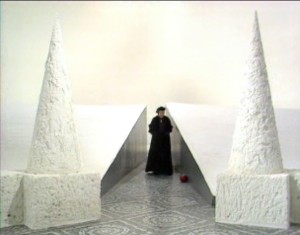 |
As ever with these massive period pantechnicons, the casting was a source of endless off-topic fascination. You couldn’t chuck a halberd in most of the plays without clobbering a brace of famous names, and some came from well off the RSC-approved beaten track. Miller’s decision to cast John Cleese as an uptight puritanical Petruchio in The Taming of the Shrew proved to be comedy gold, and Leonard Rossiter, sporting exactly the same beard as Cleese, was the only great thing in the otherwise rather flimsy Life and Death of King John. Further down the list, Johns Birds and Fortune were arch artisans in Timon of Athens, Rikki Fulton was a Scotch and wry pedlar in Winter’s Tale, and Phil Daniels did a punked-up Puck for A Midsummer Night’s Dream. (The choice for Bottom was less unexpected – yep, Brian Glover.) Other experiments weren’t so successful. Again, the opening Romeo and Juliet stank the place out with much of its acting, especially the stilted turn from Anthony ‘Oh then. I see. Queen Mab. Hath been. With you.’ Andrews, and while it must have seemed like a wheeze to get Roger Daltrey in to play both Dromios (with a little Colour Separation trickery) in The Comedy of Errors, the results squeaked for themselves. Actually, perhaps the most unusual aspect of the productions was an inexplicable casting anomaly: 37 plays. Almost 150 hours of solid period television drama. Number of appearances by Brian Blessed: zero. What giveth?
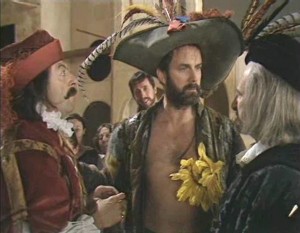 |
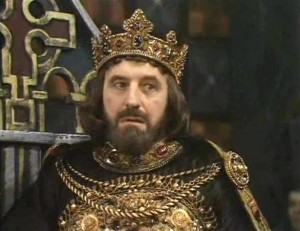 |
Well, we may josh, but the best of the plays did live on, through the cheerfully ramshackle medium of the educational VHS cassette, which ensured that English students for the next decade would be all over the madly varying tones and production values, albeit increasingly wondering, as telly advanced in technique, why the camera never cut away, why they were always indoors even when they said they weren’t, and why Hannibal Lecter is being so easily duped by that bloke off the British Gas ads. Which was, perhaps, not the sort of grand immortality the BBC governors had envisaged for the series, but it’s a legacy nonetheless. “If I should die, think only this of me: that there’s a dusty old VHS in some corner of an English Lit resources cupboard that is forever Sunday night on BBC2 circa 1980.”






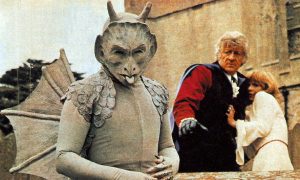















Nigel Turner
November 7, 2014 at 6:12 am
You mean that guy from ‘Lovejoy’ did all the music? Or do you mean ‘Deadly’ Dudley Simpson?
Glenn Aylett
September 16, 2018 at 11:39 am
A so called Christmas treat in 1982 for form 4 L at the now closed Whitehaven Grammar School, a whole morning devoted to watching the BBC 2 adaptation of Macbeth on VHS. This treat veered from apathy to muttering from some of the class about the cheapness of the sets and why we had to sit through this. Better than being sent out to play rugby in snow, though.
richardpd
October 13, 2018 at 7:51 pm
I guess Brian Blessed bellowing out “Is there anyone here who hasn’t slept with my daughter!?” & other Television Centre shaking lines in I, Claudius put the makers of this off casting him in any of the plays.
I’ve got the feeling I’ve seen at least on of these, I used to think it was Macbeth but I remember now it was a cartoon version that looked like late 1970s version of The Lord Of The Rings.
Glenn Aylett
October 14, 2018 at 1:03 pm
These did keep the BBC drama department very busy for 4 years and no doubt people in the scenery block and costumes had plenty of work to do as these were largely based indoors and had a big cast who had to be kitted out in 16th century and Roman clothing. I wonder if Auntie was to remake all of the Shakespear plays now, they’d be location based multi million pound efforts that could attract a decent audience. I’d willingly watch Macbeth if it had Peter Capaldi in the lead role.
Applemask
August 3, 2020 at 1:48 pm
Not true about King John – not the bit about it being “a bit flimsy”, although that’s largely Shakespeare’s fault – but there is more of interest than Rossiter. Specifically Mary Morris as his mother and George Costigan, who’s brilliant as a magnificently picaresque git.
Glenn Aylett
August 3, 2020 at 6:46 pm
My old school is being demolished and I wonder if in one of the cupboards, some very dusty VHS tapes containing the BBC Shakespeare will be found by the demolition workers.
richardpd
August 4, 2020 at 1:49 pm
Does anyone remember the BBC Shakespeare reimagined series in the early 2000s?
One of them was a good way for Billie Piper to shed her “British Britney” image and show she could really act.
There’s the occasional talk of remaking I, Claudius – if the original scripts were used, and the production standards were as high as the were for Rome, it should be good.
Droogie
August 5, 2020 at 1:45 am
My earliest memory as a school kid of Shakespeare being made more approachable was a comic book adaptation of Macbeth we were allowed to read. A very noble attempt at making the Bard more accessible, but all I remember were bloody huge speech bubbles In each panel trying to cram in all the important stanzas that just ended up dwarfing the artwork.
Tom Ronson
March 6, 2021 at 11:36 pm
Hot potato orchestra stalls, Puck will make amends!
Richardpd
January 8, 2022 at 3:39 pm
My local library used to have a fww of these for rent, normally the first edition tapes from the mid 1980s, along with a full set of The Six Wives Of Henry VIII.
TV Hell had a feature on costume dramas, noting how the same set of pewter goblets were used in many productions, along with eating cold chicken & burping a lot.
Glenn Aylett
July 12, 2022 at 7:52 pm
The BBC was certainly far more intellectual then and I doubt even BBC Four would devote hundreds of hours to Shakespeare now. However, go back 40 years, and BBC Two decided that every Sunday night must be devoted to Wagner’s Ring Cycle, five hour operas that except for the best bits like The Ride Of The Valkyries and Siegfried’s Funeral Music, were a very acquired taste with people in primitive costumes singing in German. Yet to the million that tuned in and listened to the simulcast in stereo on Radio 3 probably an uplifting experience, but not the sort of thing most people would enjoy.